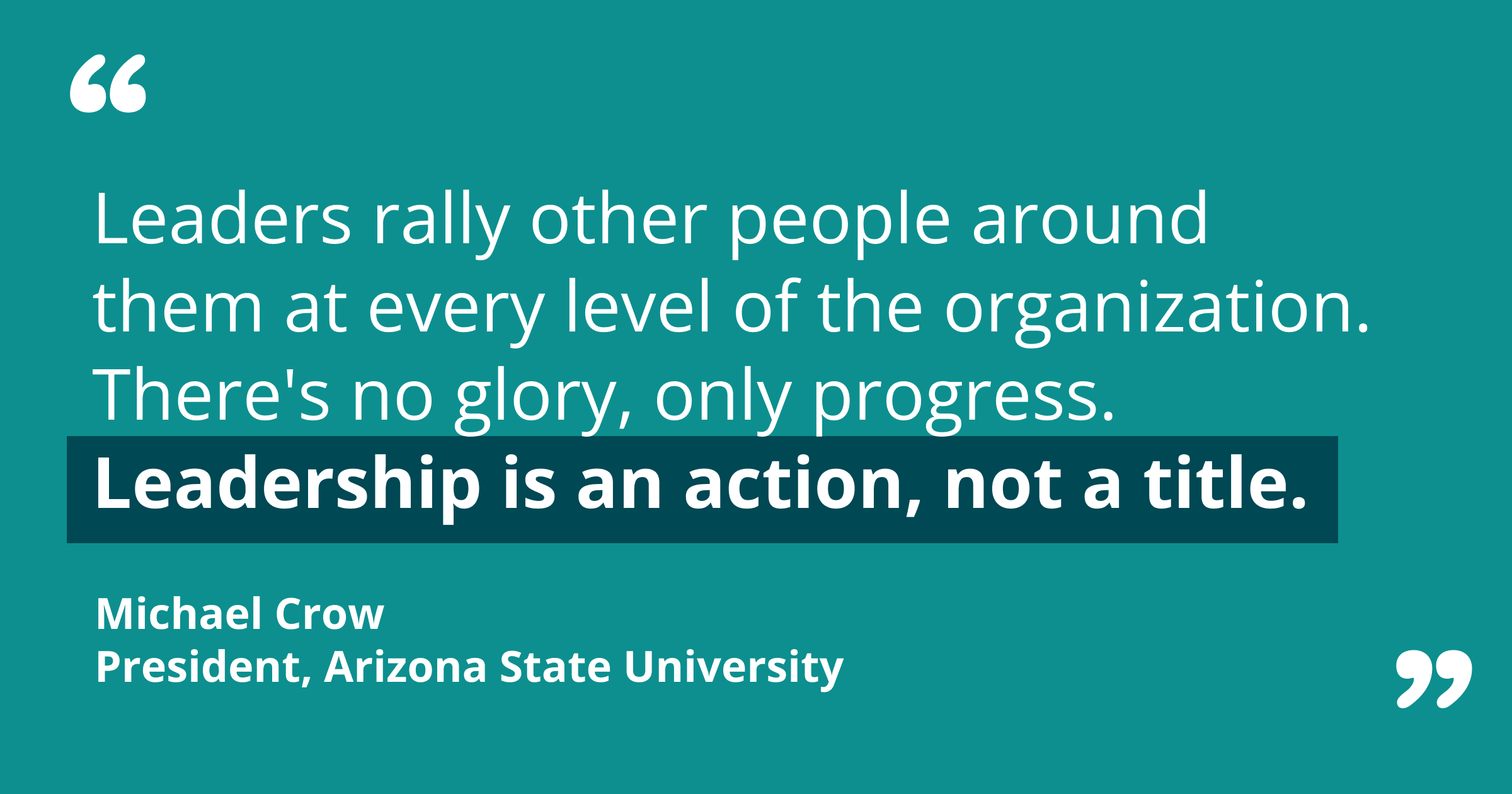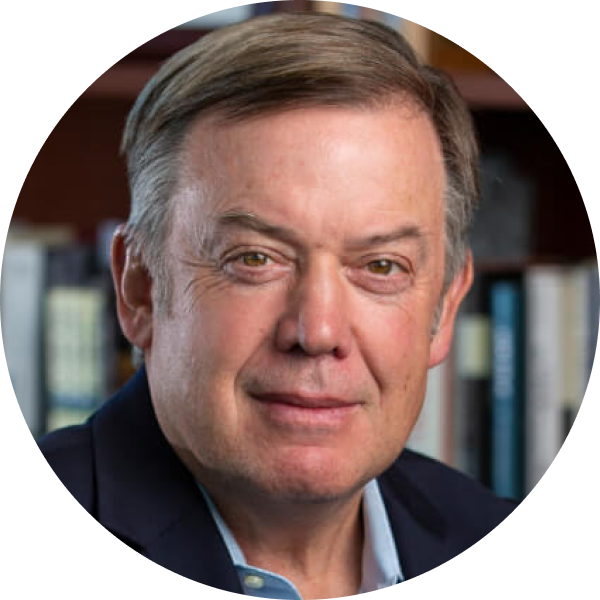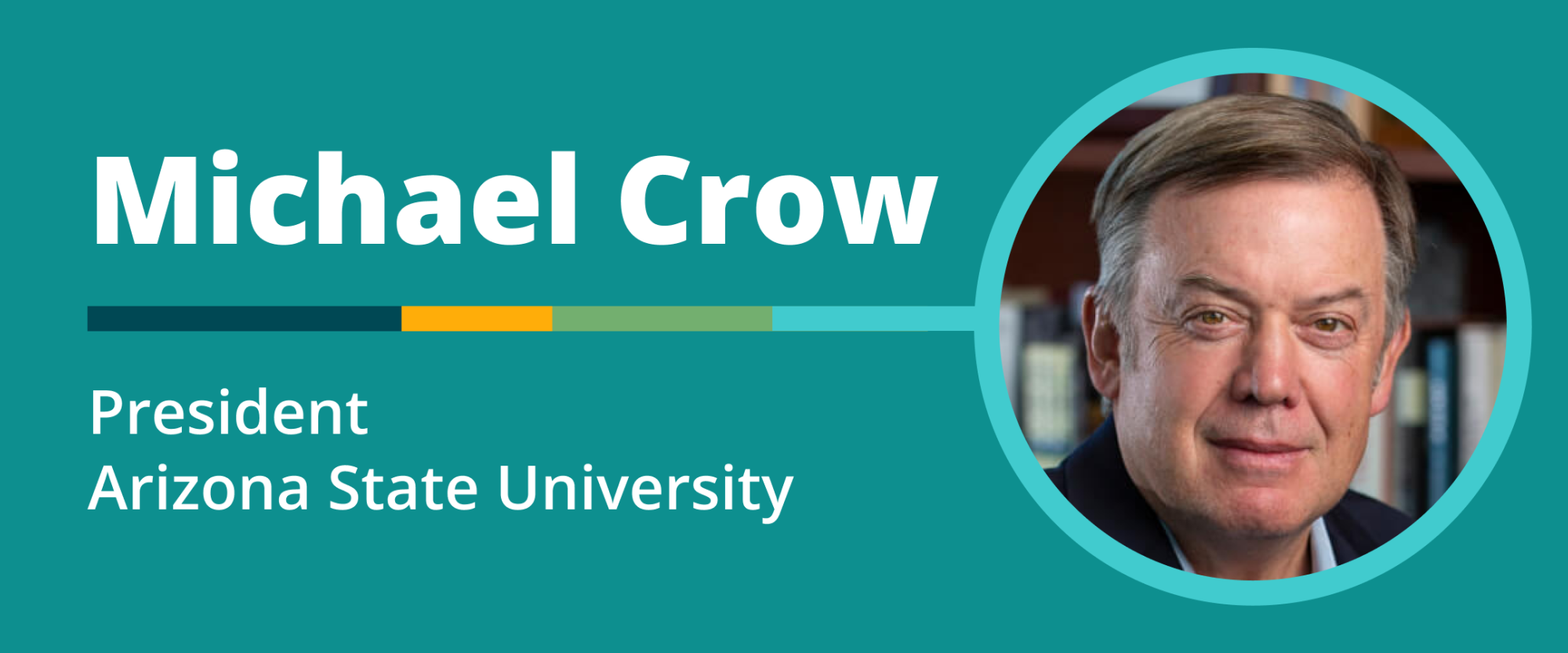In his powerful, straightforward keynote at the UIA National Summit, Dr. Michael Crow, president of Arizona State University and UIA Board Chair spoke candidly about the core problem with American higher education, the essential role of public universities, the risk-taking element of truly effective leadership, and fostering student success.
The Sum of Us
President Crow began his keynote with a nod to Heather McGhee’s 2021 book The Sum of Us. While Dr. McGhee had written specifically about racism’s toll on American society, President Crow borrowed her central idea – when a few people aren’t being and doing their best, it diminishes all of us – as a starting point to discuss the failure of higher education:
We are so much less than we could be because so many people have been unable to find the pathway to realize their full abundance. In a country like the United States, our sum is dramatically below where it could be. Our universities have more people who attend and do not graduate than those who graduate. That is an abject failure of the highest order. There are no excuses. It's us. We did that. It is failure for our sector to drop out half the people that attend.
He acknowledged an algorithm for success in our democracy, and how higher ed has become part of the problem:
You think that 40 million people who went to college and didn't graduate are happy campers? You think that 75% of the people with college debt are happy because they got nothing for it? We pontificate from on high about having all the brains, pathways, and power, yet kids from certain neighborhoods have very little chance of success.
President Crow noted that the chances for lower-income families haven’t improved in over 50 years, while students from wealthier families currently have an 80% chance of graduating from college, irrespective of their academic abilities. This inequity fuels the perception that fewer young people are interested in college. He asserted that talent, ambition, and dream are as strong as ever; however…
They don't want to get a degree that, in the market, is not worth anything. They don't want to be told, ‘Quit your life for four years, quit taking care of your younger siblings. Come over here, indebt yourself, and work on a product that you probably don't have a good chance of finishing.’ As a result, most talent is left on the table, and we live in a world where we think that people are stupid. It’s absurd.
Supporting Student Success
Higher education has created the problems of diminished expectations for and participation in a college education, said President Crow, and it’s higher education’s responsibility to fix those problems. He shared an example of how that might look. Charles Vest, then-president of the National Academy of Engineering, approached ASU with a proposal to create a Grand Challenge Engineering School. The administration then reimagined the university’s Polytechnic campus as a nexus for studies in interdisciplinary sciences, engineering, management, technology, and education. Instead of weeding out a third of underperforming freshmen, as had been the standard practice, they shifted the focus to encouraging and supporting students toward an engineering degree. President Crow shared that ASU graduated 900 engineers in 2011 and 7,200 in 2024:
We were running a weed-out culture. Now, our engineering students have the same market value as Illinois, Stanford, UCLA, Washington, and Texas. Our algorithm for success was altered. There is no gap to your coming in. Don't know math? We'll teach you. Want to learn engineering now and learn the math later? We'll have that as a route. We made all this stuff happen.
The Essential Role of Public Universities
President Crow reminded us that public universities are critical for the success of democracy, what John Adams called “the seminaries of learning” as the Founding Fathers were designing the American republic. The taxpayers who contribute to higher ed institutions deserve to benefit from those institutions because properly functioning public universities are essential for building a future in which everyone can believe. Citing research by the Center for the Future of Arizona, a nonprofit that partners with ASU, President Crow focused on one of its shared public values: “One intense shared ambition is a pathway to success in college. If you're not graduating your students, I'm sorry, you are a failure.”
Like many of the UIA’s member institutions, ASU has increased its four-year graduation rate by over two and a half times. While this is something to celebrate, it has also yielded enough data to further prove that students’ probability for success is still heavily influenced by their family income.
The essential role of the public university is to adapt to the people, not to have the people adapt to them. Stop attempting to be like a British academy where you assume that everyone will learn the same thing. That's not a public university. The public is so diverse right now: every family background, ethnic background, learning modality, type of intelligence. If we haven't adapted to all of that, we still think it's about efficiency, about getting more money from the stupid people elected to public office. It doesn't have anything to do with any of that.
The Best Leaders Are Risk-takers
President Crow insisted that leadership is about pushing past the status quo and taking big risks. He equated it to the level of courage required of the leaders who formed American democracy and corrected the flaw of slavery in our country, concluding that leadership is more of a mission than a job:
Leadership's not just your assignment or title. Leaders rally other people around them at every level of the organization. If someone calls me a college administrator, literally, I want to puke. It's like being a prison warden. I'm a professor who happens to be the president of a university, who's paid more money than most other people in the institution to make decisions, help fulfill our mission, find other leaders who can carry out that mission, and make hard choices until replaced, period. There's no glory, there's only progress. Leadership is an action, not a title.

He proposed that instead of being cynical about the people who lead us, we should adopt a leadership mindset for the level at which we work: understanding and embracing the complexities that face us, and taking informed risks that will contribute to the system’s overall success.
Audacious leadership demands fearlessness on each individual part. Don’t just say, ‘That's not going to work. They're going to be mad at me.’ Fight back with facts, with progress, with achievement, with analytics, with resources. Fight back with new ways that you solve the problem.
And, he added, if solving a problem creates more problems, solve those, too. There are no simple pathways, yet effective leaders aren’t afraid of embracing nuance and complexity.
Help Higher Ed Give Americans What They Need
While perfection may be impossible, progress is certainly possible, and President Crow urged his audience not to confuse the two. He noted many of the concerns that Americans had voiced before the 2024 election, observing that the current state of higher ed played a role in driving that dissatisfaction: “We've got 345 million people, and over ten percent of them went to college and never finished, and more than half of them don't like anyone in this room. We've got to figure out how to fix that. Graduating 100,000 people is part of that. The point is that you're all fighters for democracy. You're all in leadership positions. Leadership is action and not a title, and we really need to work on these things.”
Note: This episode of the University Innovation Alliance’s Innovating Together Podcast originally aired on March 17, 2025. The podcast appears live on YouTube, Facebook, Twitter, and LinkedIn.
Resources Mentioned in This Episode
- Dr. Michael Crow: Arizona State University President and UIA Board Chair
- Grand Challenge Engineering School: a program offered by ASU’s Ira A. Fulton Schools of Engineering and based on a model proposed by the National Academy of Engineering
- Increased graduation rate over projections: ASU, like other UIA member institutions, has steadily increased the number of undergraduate degrees awarded over the past decade
- The Sum of Us by Heather McGhee
Watch the Archive of the Keynote
Bios of Guest and Co-Host

Dr. Michael Crow became Arizona State University’s 16th president in 2002. He has guided ASU’s transformation into a leading public metropolitan research university, combining high academic excellence, inclusiveness, and societal impact. Under his direction, ASU focuses its teaching, research, and creativity on the major challenges and questions of our time, as well as building a sustainable environment and economy for Arizona. He has committed the university to global engagement and to setting a new standard for public service. During Dr. Crow’s tenure, ASU has established major interdisciplinary research initiatives including the Biodesign Institute, the Global Institute of Sustainability, the Flexible Display Center, and the Center for the Study of Religion and Conflict; new schools including the School of Global Studies, the School of Human Evolution and Social Change, and the School of Earth and Space Exploration; and an expanded research infrastructure. He has overseen a dramatic increase in research awards, including the eight largest gifts in the university’s history. Prior to joining ASU, Dr. Crow was executive vice provost of Columbia University, where he oversaw Columbia’s research enterprise and technology transfer operations. A fellow of the National Academy of Public Administration and member of the Council on Foreign Relations, he is the author of books and articles relating to the analysis of research organizations and science and technology policy. He currently serves as the University Innovation Alliance’s Board Chair.

Co-Host: Bridget Burns, Executive Director, University Innovation Alliance
As a trusted advisor to university presidents and policymakers, Dr. Bridget Burns is on a mission to transform the way institutions think about and act on behalf of low-income, first-generation, and students of color. She is the founding CEO of the University Innovation Alliance, a multi-campus laboratory for student success innovation that helps university leaders dramatically accelerate the implementation of scalable solutions to increase the number of college graduates.
About Innovating Together
Innovating Together is an event series that happens live on YouTube, Facebook, Twitter, and LinkedIn. It also becomes a podcast episode. Every week, we join forces with Inside Higher Ed and talk with a higher education luminary about student success innovations or a sitting college president or chancellor about how they're specifically navigating the challenges of leadership. We hope these episodes will leave you with a sense of optimism and a bit of inspiration.
Rate, Review & Subscribe
Learn why hundreds of people have rated the Innovating Together podcast 5 stars. Please join others and rate and review this podcast. This helps us reach and inform more people -- like you -- who are committed to helping more students succeed.
Click here, scroll to the bottom, tap to rate with five stars, and select “Write a Review.” Then be sure to let us know what you loved most about the episode. Also, if you haven’t done so already, subscribe to the podcast. You'll never miss an episode.

